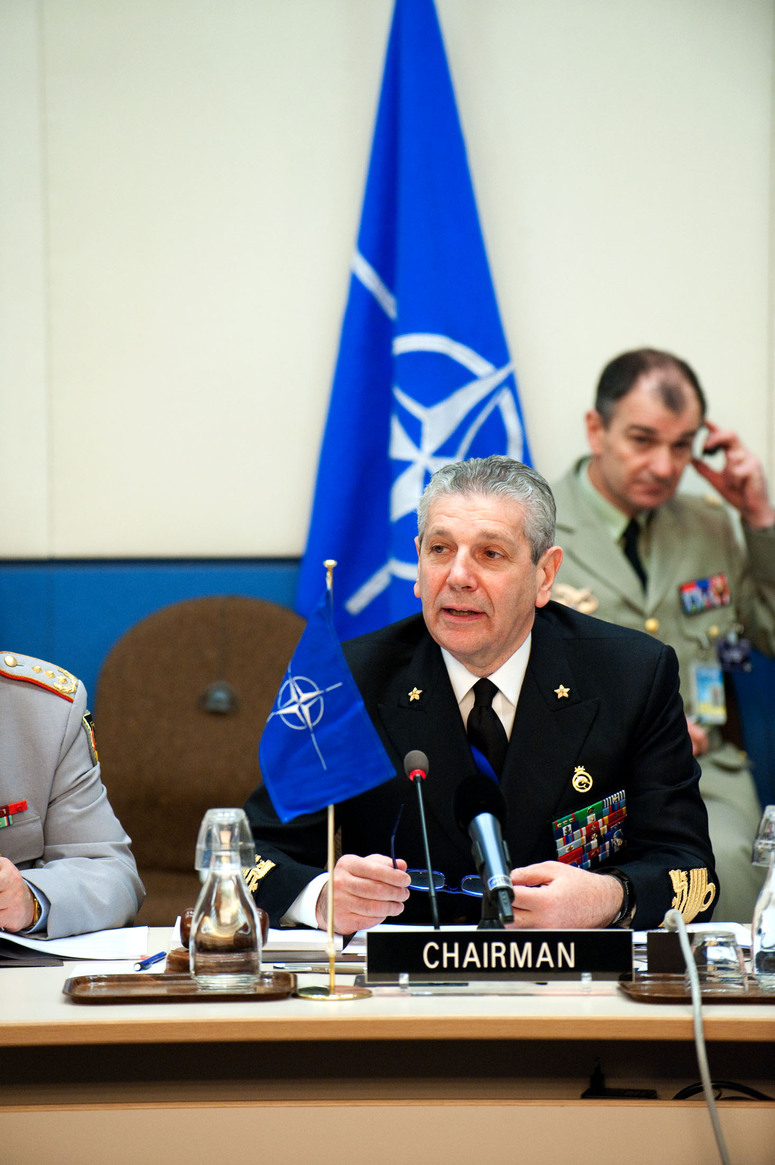Opening remarks
by the Chairman of the Military Committee Admiral Giampaolo Di Paola at the meeting of NATO’s Military Committee in Chiefs of Defence Staff
- English
- French

Ladies and Gentlemen,
I would like to welcome, here in Brussels, the Chiefs of Defence of all the Nations represented today, especially our partner nations; also, the two Strategic Commanders – SACEUR and SACT; the Commanders of our Joint Headquarters at Brunssum, Naples and Lisbon; the Chairman of the EU Military Committee; the staff that have prepared and will support this meeting; and, of course the members of the media. To all of you, a warm welcome, as we undertake the first meeting of 2011 of the NATO Military Committee in Chiefs of Defence format. And, for those for whom this is their first meeting, a particular welcome.
The timing of this meeting is important: at the Lisbon Summit of Heads of State and Government in November 2010, a number of key tasks were agreed and all of them have a key military dimension; many of these have deliverables or require decisions in March or June, and so we have much to discuss. Key outcomes from the summit were the adoption of NATO’s new Strategic Concept; the agreement to develop NATO’s Missile Defence Capabilities; a strong emphasis on cooperative security through an enhanced partnership policy; a declaration on the renewed, reinvigorated, partnership between NATO and Russia; and the way forward for Afghanistan with the start of the process of Transition this year and the establishing of a long-term enduring partnership with Afghanistan.
For the new Strategic Concept itself, although I said “NATO’s new Strategic Concept”, fundamentally this is a Strategic Concept which addresses the common security needs of our global community as NATO seeks to take forward an agenda of contributing to deliver, within the wider context of the International community, stability and security in the light of evolving and emerging threats. Fundamental to the delivery of that security is, therefore, a Co-operative security approach through an enhanced partnership policy, and I am delighted to be able to say that this is more than just words – over the course of the next 2 days, Chiefs of Defence of 66 Nations have the opportunity to discuss how to deliver common responses to common security challenges, as well as our on-going operations, where NATO is engaged together with an extended coalition of Partners. Indeed, our best example is, of course Afghanistan, for which we now have about 50 Nations participating, with the possibility of yet more still to join.
For me, this is real proof that NATO continues to be relevant and you, as Military heads of your own countries, have a critical role to play.
In our first two meetings of today, Mediterranean Dialogue and Euro-Atlantic Partnership, we will focus on the specifics of Partnerships; not just from our NATO perspective, but even more important from the perspective of our partners and how they see us as needing to adapt, such that we capitalise on the gains that we have already made from successful engagements with them and take such gains even further. I am delighted that we have with us Assistant Secretary General for Political Affairs Security Policy Ambassador Dirk Brengelmann, who will make the opening addresses at both of these sessions. We start in this format, with the 7 Nations that make up the Mediterranean Dialogue, and I am extremely pleased to be able to welcome Algeria, Egypt, Israel, Mauritania, Morocco, and Tunisia who have joined us today.
We will also hold meetings with our Partners that are contributing to the Missions in Kosovo and Afghanistan, and for those sessions we will be joined by key players to give us their direct insights from the front line. For Kosovo, we will be joined by Commander KFOR Lieutenant General Erhard Buhler and by the Head of the EULEX mission, Mr Xavier Bout de Marnhac. For Aghanistan, COMISAF, General David Petraeus will join us by VTC, whilst the Secretary General’s Senior Civilian Representative – Ambassador Mark Sedwill – will join us here in person. For both of these sessions, SACEUR, Admiral Jim Stavidiris, will set the scene before we open it to the wider debate.
This afternoon we will meet with the Russian CHOD. The relationship with Russia is a key strategic aspect of the new NATO, and the Lisbon Summit has clearly indicated the way forward. I believe both sides share a renewed sense of both purpose and optimism, and we stand on the threshold of significant steps forwards in more meaningful military-to-military co-operation in a significant number of areas, including Missile Defence, Counter Terrorism, Counter Piracy, and Search and Rescue.
Tomorrow, we will meet with Ukraine to assess together the reform that the Ukrainian Armed Forces are undertaking and the way forward to deepen our military co-operation
Finally, we will also meet in the NATO-only format to discuss the Military implications of the New Strategic Concept, the NATO Reform process – Command Structure, Agencies and Defence Capabilities; as well as having the opportunity to have an informal session with the Secretary General. He will indicate us the political guidance and directive we need to take forward our military work.
So, we have a busy agenda and an opportunity to contribute to shape the future. Let us, therefore, move immediately on and start our discussion on Partnerships. Again, I want to thank you all for taking the time to come to Brussels – it is your inputs and your advice that ensure that our collective voice speaks strong and speaks well, and that it is heard as the broad, wise and consensual military voice of those who share the same goals and ideals of contributing to peace, international stability, and security.
So, with those introductory remarks in mind, let us now proceed. But first, can I please ask the members of the media to leave the room.
